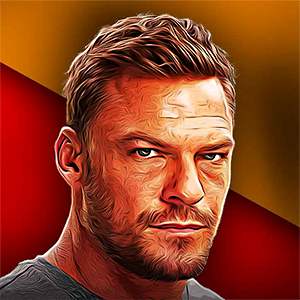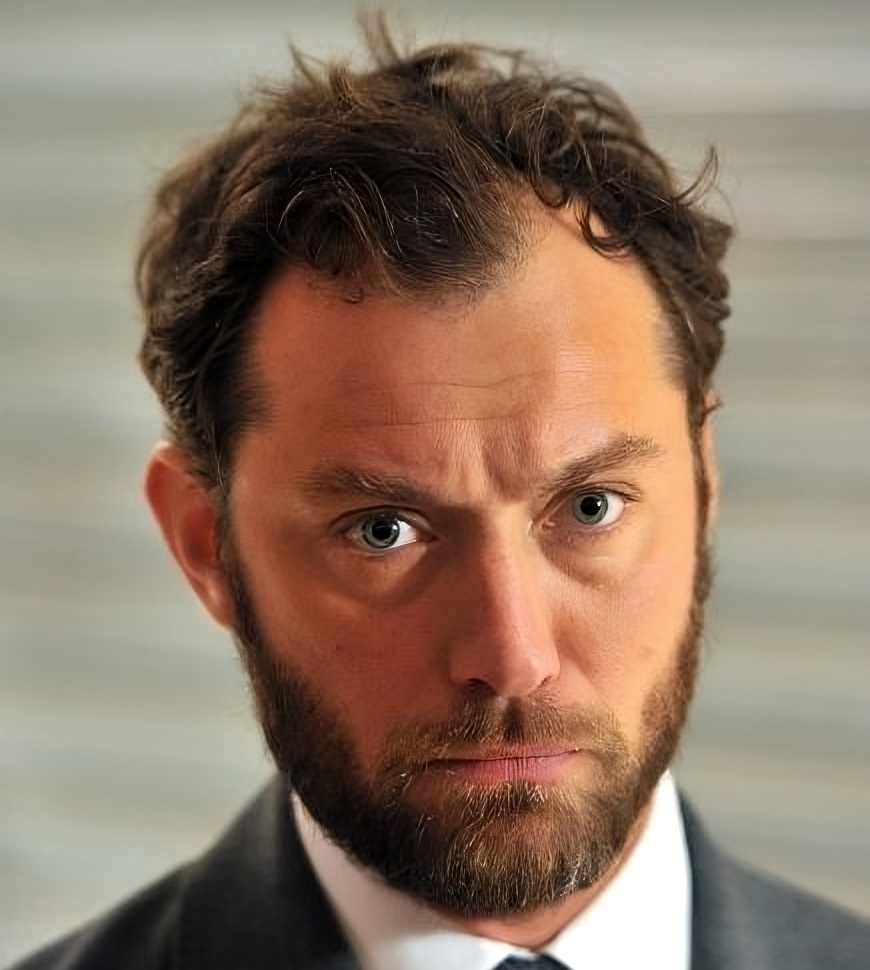The Neptune had already given a great amount of information for the system, but Xiao had insisted on looking more into what was going on between the gas giants and the dwarf planet. Michael relented because it would keep up the ruse of what Starfleet was officially doing here in the system.
In mere minutes, the Neptune was sitting purely to observe the phenomenon that Xiao had beamed on about, but now the sheer magnitude of what was in front of them left even Michael speechless. Though a fair distance from the ship, the scene was like something that as the captain of a science vessel, you’d only dreamed of seeing.
The space was dominated by the gas giants, each a titan of radiant shades of crimson and sapphire. A faint flash of lightning occasionally indicated that storms were active and lighting up the area with immense flashes. In between the giants, looking like someone captive, set the dwarf planet in a constant gravitational struggle.
Michael ordered magnification of the dwarf planet, and as the ship’s viewscreen enhanced the scene, what was revealed was even more fascinating. The surface was fissured and fractured, with scorched regolith reaching beyond the terminator, blending seamlessly with the dark side of the planet. Massive plates of crust had been pulverized through the constant tides of gravity pushing between them. Through great chasms that radiated across the surface with fractal chaos, the dying heart of the planet’s core; exposed in the depths of molten fire. The unseen forces of nature, gripping the planet tightly, determined to tear it to pieces..
A faint path of vapor and dust drifting outward from the dwarf planet; evidence of an epic celestial duel as the gas giants battled for superiority over which would do more damage. Images of angels with glistening halo’s were brought to the forefront of Michael’s mind, as the trail glimmered in the radiance of the gas giants.
Michael backed into his seat, holding onto the thoughts and feelings of what he had just witnessed. Xiao stood up and, with glistening eyes, he saw a different picture on the surface of Vraekton Six, like a freshly blank canvas before the first flick of color, he began to fill the scene out with what his scientific mind observed. The surface looked like an ocean tide as it began to swell and contract in slow succession. The molten rock spewed up and froze on contact with the frigid surface, as moments of magma displacement violently occured. The planet’s opposite reactions contrasted from day to night. In the daytime, there was a current carmine glow from the volcanic venting that was occurring in such quick succession. In the nighttime, it seemed calmer as a faint smoulder emanated from the heat that was escaping from the core of the planet. The most tenuous trace of vapor reveals what could have been present before the catastrophic event on the planet.
Xiao envisioned what would happen in his mind as he realized he was seeing something that few had ever gotten the chance to witness. This was a world in its final act of existence. Not from an explosion or sudden end. This would be from the quiet, unyielding pull of gravity, which was slowly dismantling the planet piece by piece. In approximately a few million years or even less, Vraekton Six would cease to exist. The only remains would circle one of the giants in the manner of a ghost. This being a silent witness to the immense forces that shaped and ultimately destroyed it.
******
“Standard orbit, Lieutenant,” Alex commanded as the fourth planet began to fill the viewscreen. He stood from his chair and took two steps forward, as if it afforded him a better view. Ahead of them, suspended in space like a lustrous jewel, an inviting marble of deep blue oceans and luscious greenery contained about a single super-continent. The atmosphere almost appeared to glow a bright cyan but remained thin and delicate at higher altitudes, like the most tenuous of haze.
On the continent, the sea of greenery was only broken by the scars of inland seas and river systems; countless fragile veins of water, sourced in the springs of great mountain ranges to the north. They terminated in vast, untamed deltas, with shallows so clear they appeared like sheets of glass.
“Certainly looks inviting,” Wallace commented, “If this one turns out to be a bust, might take me a deck chair and some margaritas to one of those beaches… soak up some rays.”
“Atmospheric humidity 97 per cent, average temperatures between 38 and 42 degrees centigrade, depending on latitude,” Sovek reported, intentionally verbalising the climate data to highlight the commander’s unwise shore leave plans.
“Yikes, I take that back, sounds like it could make Florida look refreshing, by comparison,” Wallace retracted.
“Life signs?” Alex requested
Sovek initiated a sweep. His hands, gliding skillfully across his console to calibrate the appropriate bandwidth and scanning geometry to detect life. “Inconclusive,” he replied.
Alex took his eyes off the view screen for the first time since they arrived in orbit. ‘What the heck is so inconclusive. I can practically see the trees from here,’ he thought to himself. “Can you elaborate?”
Sovek looked up from his data, “A combination of environmental factors and severe instability in the upper atmosphere is scattering my scans, Captain.” He reported stoically.
“Try compensating by narrowing the upper subspace band, that might cut through the interference,” Wallace proposed.
Sovek humoured the commander, “Ineffective, the interference is too severe.”
“Great place to hide if you don’t want to be found, ” Wallace suggested. Without sensors to confirm, their options were severely limited in trying to surreptitiously scout for the Romulans.
Alex was about to consider alternatives when he suddenly remembered they still had the Neptune at their disposal. “The Neptune has a better sensor suite than us; could they cut through the interference?”
“Possibly, I must admit, I am not fully aware of her specifications.” Sovek conceded. Though he was not prone to emotions of embarrassment, he knew humans would find humour in the realisation that an individual holding degrees in nine separate scientific disciplines couldn’t find the time to read a spec-sheet. The truth is that, generally, starships didn’t interest him. There was little variation between designs that didn’t warrant an expenditure of his time to study. The only characteristic he found intriguing about Fairfax was the unique geometry of her warp field.
“Conn, open a channel,” Alex ordered, turning his attention back to the viewscreen. “Captain,” he greeted Michael Ryder as he appeared on screen. “We seem to be having trouble penetrating some atmospheric interference on the fourth planet. I was wondering if you guys might take a stab at it?”
Michael snapped back to reality as the face of Captain Dubois appeared in front of him, making him jump slightly. After listening to the Captain, Michael gave a nod and looked at Xiao, who returned to his console and gave another look at the information of Vraekton four.
Michael looked for a moment “Can you explain exactly what your issue is so we have a better grasp of the situation?”
Alex glanced over at Sovek and nodded; the Vulcan could do a much better job at explaining the issue than he ever could.
“A combination of water vapour, electrostatic charge and ionisation in the upper atmosphere is scattering our sensors,” Sovek explained accurately.
“We were hoping the Neptune’s sensors might be a bit more capable than our own,” Alex added.
Xiao nodded and began to speak now that he understood the information that had been requested. “While I am able to download the information from the probes, the only thing I can tell you is that lifeforms are present, but I am not able to localize a location for the life forms. What I surmise is that these are indigenous to the planet, but from the information it would seem both sea and land species could be present. I think for us to learn anymore we need to initiate orbital insertion as soon as possible.”
Alex took a brief conference with his science officer, “What do you think?”
Sovek tilted his head, “Without more sensor data, the only logical course of action would be for the Neptune to join us in orbit,” he said.
“Could we retrofit some of our probes, maybe try to find a workaround?” Wallace weighed in with another suggestion.
“A class five probe is the most logical device for the task. However, its bandwidth is limited and would require extensive modifications.” Sovek explained.
“Would it work?” Alex asked.
Sovek paused. Were he human, it would have likely been appropriate at this point to remind his superiors that they had a better option staring them in the face; however, as a Vulcan, he chose a response more grounded in logic. “Impossible to say, Captain. There are too many variables to accurately determine a probability for success at this time.”
Alex looked back over at the viewscreen, “Captain, I think our best option is to have you join us in orbit of Vraekton four.”
Michael nodded, “We’re ready to go, just say the word.” He replied as the ship already started to head away from its current location to face towards Vraekton four.

 Bravo Fleet
Bravo Fleet









